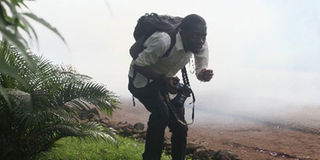Cherishing right to media freedom

A photojournalist tries to avoid being hit by stones during a demonstration in Kisumu on April 26, 2016 in which protesters were calling for the removal of IEBC officers. Journalists will celebrate World Press Freedom Day on May 3, 2017. PHOTO | FILE | NATION MEDIA GROUP
What you need to know:
- The day was set aside by the UN General Assembly to celebrate the fundamental principles of press freedom to review how the media perform their responsibilities.
- The Windhoek Declaration envisaged a media liberated from government, political or economic control.
- With nearly 139 radio stations, 60 TV stations on air and more than 60 publications on the streets, it is surprising how Kenya ranks poorly in global media freedom indexes.
- Some corporate advertisers also use their financial muscle to impose censorship on the media.
As we mark on Wednesday the World Press Freedom Day, it will be interesting to take stock of how far the ideals and principles of the Windhoek Declaration on which it is premised, especially the independence of the media, have been observed in Kenya.
The day was set aside by the UN General Assembly to celebrate the fundamental principles of press freedom to review how the media perform their responsibilities.
It was meant to defend the media from attacks and honour journalists across the world.
The Windhoek Declaration envisaged a media liberated from government, political or economic control.
The declaration also stood against monopolies in the industry, and defended the widest possible distribution of media.
BEST WORKING ENVIRONMENTS
That Kenya has one of the best working environments for media in the region is not in doubt.
That freedom is anchored and protected in the most progressive Bills of Rights globally is also not in contention.
Articles 33, 34 and 35, some of which have been actualised through the Media Council Act 2013, KICA 2013 and Freedom of Information Act 2016 set the stage for the actualisation of the Windhoek Declaration.
With nearly 139 radio stations, 60 TV stations on air and more than 60 publications on the streets, it is surprising how Kenya ranks poorly in global media freedom indexes.
However, these two laws are still problematic and call for a review, given that on a number of issues, they seem to cause confusion and expose journalists to more harm.
This is so, especially on fines, board selection and complaints handling.
POLITICAL INFLUENCE
While sections of the law, including misuse of communication equipment and relating to undermining the authority of persons in big offices have been declared unconstitutional, some statutes need to be updated. They include the Books and Newspaper Act, Defamation Act, and the Official Secrets Act.
Media independence in Kenya is still very problematic due to control of advertising revenue and ownership and/or political influence.
Through formations such as the Government Advertising Agency (GAA) and MyGov, backed up by a directive that government advertisements should be minimised in the private media, the State is seen as interfering with their independence.
Some corporate advertisers also use their financial muscle to impose censorship on the media.
JOURNALISTS SACRIFICED
A number of media houses and journalists have borne the brunt as some corporates withdrew advertisements because of editorial content.
Several cases by corporates in court and huge fines have been used to curtail media independence.
This has compromised independence and forced some journalists out of their jobs.
Because of ownership-related issues, a number of independent- minded journalists have been sacrificed.
The cases of Chaacha Mwita, Denis Galava, and others, are still fresh in people’s minds.
MEDIA INDEPENDENCE
Media owners influence what to publish so as to increase sales without caring about its impact. Cases where media owners are also politicians, preachers and presenters on their own stations are classic examples of how not to promote media independence.
Journalists have complained of cases of media owners clearing editorial content, programme guests and other professional issues.
Some journalists have been targeted because of the political leanings of the media they work for.
Besides external interference, some journalists solicit bribes to write stories, eroding their credibility.
Poor pay and working conditions also undermine independence as journalists easily get compromised and pursue stories guided by individual rather than the public interest.
JOURNLISTS ASSAULTED
Sources take advantage of this to interfere with media independence.
A number of journalists have been assaulted by security officers and political thugs.
The cases of Isaiah Gwengi in Siaya, John Kituyi in Eldoret, Francis Nyaruri in Kisii, among others, are yet to be solved.
Lately, media houses and some individual journalists are being trolled, undermining independence.
Harassment of media by county government agents presents a big challenge to journalists’ independence.
There is a need for a system to enhance independence, build the capacity of the media to set the agenda of public interest and establish a regulatory framework that cultivates professionalism.
Media have not been streamlined into national development policies, locking out a sector that is crucial to national development.
Mr Bwire is programmes manager at the Media Council of Kenya and a journalists’ safety trainer. [email protected]




